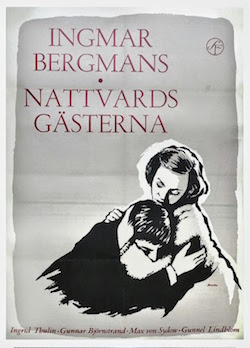Tags
1960s, 1960s film, art film, black and white, film, film review, films, Gunnar Bjornstrand, Gunnel Lindblom, Ingmar Bergman, Ingrid Thulin, Max von Sydow, movie, movie review, movies, Sweden, Swedish film
 1962
1962
Directed by Ingmar Bergman
The middle film in Ingmar Bergman’s “Faith Trilogy” is not only the best of the three, but also one of Bergman’s most satisfying overall. The small, short chamber film grapples with complex questions of faith, not just in God, but in other people, in love, and in life. The dark void of death haunts this film, not as the opposite of life, but one of its key components, and Bergman’s characters stare into it with terror.
Gunnar Björnstrand stars as Tomas, a Catholic pastor in a small town. When the film begins, he is performing communion on his small congregation who form the rest of the film’s characters. Gunnel Lindblom and Max von Sydow play married couple Karin and Jonas Persson,the latter of whom is brought to Tomas regarding his suicidal feelings and fear of an apocalyptic war. Ingrid Thulin makes the movie hers with a powerhouse performance as besotted schoolteacher Märta.
With no music, only a few different locations and a plot that plays out entirely over a couple of hours in these characters’ lives, Winter Light is one of the most intimate films Bergman ever made. Despite its low-key approach, though, the film still shows a filmmaker who was keen to play and experiment with his style. Cinematographer Sven Nykvist’s approach is more naturalistic and less fussy than usual, but still plays with light and depth beautifully.
One of the most striking scenes is when a letter written by Märta to Tomas is read by her in striking, unfaltering close-up. Doing little more than speaking directly to the camera, Ingrid Thulin’s performance is incredible, almost unbelievable in its pathos and feeling. The intentional plainness of the film and its key scenes seems to create an echo, and replicates the isolation and abandonment felt by every single character.
In Winter Light, a chain of communication has been broken. Frightened by what he perceives as “God’s silence,” Tomas speaks in empty platitudes, and in turn his silence and callousness affects his congregation and the woman who loves him. The allegorical rhetoric of this film is just as complex and sometimes ambiguous as any other Bergman film, but it feels eloquent and fully formed.
Winter Light is a cold, dark film, but what is key about Bergman is that he never descended into nihilism. There is always something hidden at the bottom of his films that speaks of hope. This film, along with the trilogy to which it belongs, questions the very concept of faith. It doesn’t offer any answer to the questions it raises, when Tomas delivers a sermon to an empty church at the film’s end, a veil is lifted and we see clearer than we did before.
